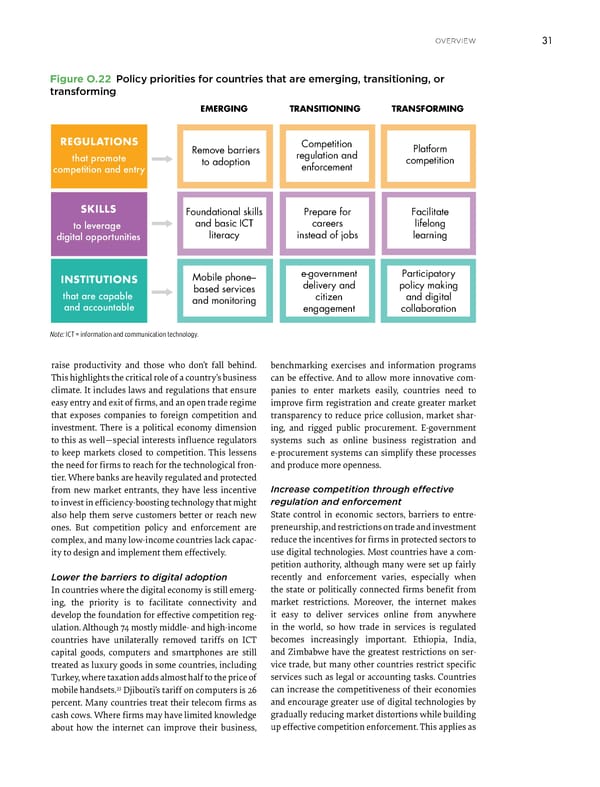overview 31 Figure O.21 The quality of complements and technology rises with incomesFigure O.22 Policy priorities for countries that are emerging, transitioning, or transforming EMERGING TRANSITIONING TRANSFORMING REGULATIONS Remove barriers Competition Platform that promote to adoption regulation and competition competition and entry enforcement SKILLS Foundational skills Prepare for Facilitate to leverage and basic ICT careers lifelong digital opportunities literacy instead of jobs learning INSTITUTIONS Mobile phone– e-government Participatory based services delivery and policy making that are capable and monitoring citizen and digital and accountable engagement collaboration Note: ICT = information and communication technology. raise productivity and those who don’t fall behind. benchmarking exercises and information programs This highlights the critical role of a country’s business can be effective. And to allow more innovative com- climate. It includes laws and regulations that ensure panies to enter markets easily, countries need to easy entry and exit of firms, and an open trade regime improve firm registration and create greater market that exposes companies to foreign competition and transparency to reduce price collusion, market shar- investment. There is a political economy dimension ing, and rigged public procurement. E-government to this as well—special interests influence regulators systems such as online business registration and to keep markets closed to competition. This lessens e-procurement systems can simplify these processes the need for firms to reach for the technological fron- and produce more openness. tier. Where banks are heavily regulated and protected from new market entrants, they have less incentive Increase competition through effective to invest in efficiency-boosting technology that might regulation and enforcement also help them serve customers better or reach new State control in economic sectors, barriers to entre- ones. But competition policy and enforcement are preneurship, and restrictions on trade and investment complex, and many low-income countries lack capac- reduce the incentives for firms in protected sectors to ity to design and implement them effectively. use digital technologies. Most countries have a com- petition authority, although many were set up fairly Lower the barriers to digital adoption recently and enforcement varies, especially when In countries where the digital economy is still emerg- the state or politically connected firms benefit from ing, the priority is to facilitate connectivity and market restrictions. Moreover, the internet makes develop the foundation for effective competition reg- it easy to deliver services online from anywhere ulation. Although 74 mostly middle- and high-income in the world, so how trade in services is regulated countries have unilaterally removed tariffs on ICT becomes increasingly important. Ethiopia, India, capital goods, computers and smartphones are still and Zimbabwe have the greatest restrictions on ser- treated as luxury goods in some countries, including vice trade, but many other countries restrict specific Turkey, where taxation adds almost half to the price of services such as legal or accounting tasks. Countries mobile handsets.33 Djibouti’s tariff on computers is 26 can increase the competitiveness of their economies percent. Many countries treat their telecom firms as and encourage greater use of digital technologies by cash cows. Where firms may have limited knowledge gradually reducing market distortions while building about how the internet can improve their business, up effective competition enforcement. This applies as
 World Development Report 2016 Page 46 Page 48
World Development Report 2016 Page 46 Page 48